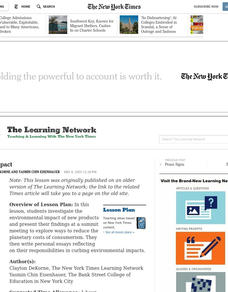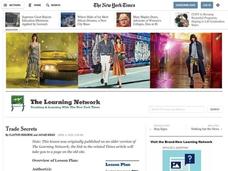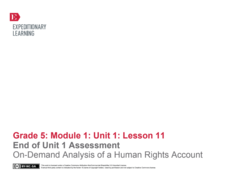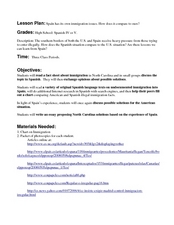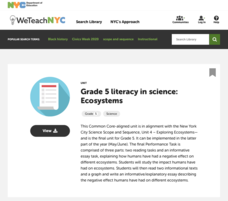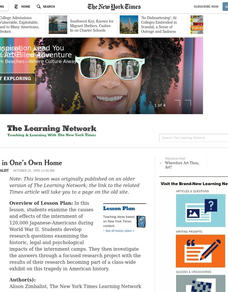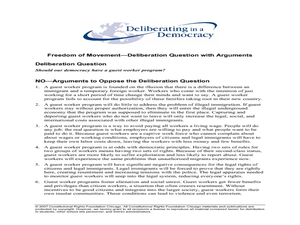Curated OER
Don't Bet The House On It!
Great real-world math application! Have the class compare and contrast their estimated home price and income data with actual data. In groups, they participate in simulations to discover how the housing market and mortgages operate....
Curated OER
By Heart
To memorize, or not to memorize: that is the question. Whether 'tis nobler to suffer the fear and anguish of committing a poem to memory, to endure the heartache, to shuffle off this fear, and face the stares of classmates with the hue...
Curated OER
How Does Your Garden Grow? Discovering How Weather Patterns Affect Natural Cycles
For the warm-up in this cool climate lesson, you will need to click on "Mapping" and then "US Mapping" once you arrive at NOAA's "US Climate at a Glance" page. Earth science explorers realize that 2012 was a warm winter for us. They read...
Curated OER
Deep Impact
How can acknowledging opposing viewpoints reinforce one's argument? Use this New York Times lesson to study consumerism and the environmental impact of new products. After reading the article "Whether a Hummer or a Hybrid, the Big...
Curated OER
Science in the Court Room
Share their opinions on the use of DNA databases in criminal investigations. After reading an article, they evaluate the pros and cons of the databases and work in groups to answer discussion questions. They write a letter to a state...
Curated OER
Paraphrasing and Summarizing
Read an article about the migration of our ancestors and write a paragraph. Pupils paraphrase and summarize to restate the information found in a nonfiction text. They write a shortened version of the reading to demonstrate the...
Curated OER
Does Mother Nature Know Best?
Investigate herbal medicine in the science or health classroom with this lesson from the New York Times. After a discussion about class members beliefs about and experiences with herbal medicines, pupils read an article that might...
Curated OER
Trade Secrets
Young analysists explore how global trade and free market policies might personally affect them. They read an article, view a series of documenteries, and engage in a class discussion. Great lesson!
Curated OER
School, Unplugged
What would school be like if you couldn't teach lessons that require technology? Would it benefit the class? Would it hold them back? Have your learners read this article and answer the basic reading comprehension questions. Then have...
EngageNY
End of Unit 1 Assessment: On-Demand Analysis of a Human Rights Account
The last instructional activity in this unit about human rights consists of a final assessment. To demonstrate the skills your class has acquired throughout this unit, they will work with a new article entitled "From Kosovo to the United...
EngageNY
Deepening Your Research
Give credit where credit is deserved. Scholars discuss what makes a credible source as they take a look at "An Apparel Factory Defies Sweatshop Label, but Can It Thrive?" Learners read the article to look for answers to the research...
Nemours KidsHealth
Healthy Snacking: Grades 9-12
Snacks—even the word can conger up a hunger. Rapidly growing teens, especially, rely on snacks to get them from one meal to the next. After reading a series of articles about nutrition and healthy snack choices, pupils fill out a report...
Nemours KidsHealth
HIV and AIDS: Grades 6-8
Middle schoolers get the message out about HIV and AIDS by designing t-shirts with information about how the diseases are spread and how people can protect themselves from infection. Groups first gain background information by reading...
Curated OER
Screen Play
High schoolers examine the New York Times review of the film adaptations of J.R.R. Tolkien's The Lord of the Rings and explore the elements of scriptwriting. They read the article about the film adaptation screenplay and examine a...
Curated OER
Immigration in Spain
How many people immigrate to Spain illegally each year? Both the United States and Spain see a lot of illegal immigration. Advanced learners will read various articles, compare and contrast the situation in both countries, and discuss...
EngageNY
Analyzing Text Structure: “The Shakespeare Shakedown”
Pupils continue reading and discussing Simon Schama's article "The Shakespeare Shakedown." They work together to analyze the article's paragraph structure, completing a note-catcher worksheet.
New York City Department of Education
Grade 5 Literacy in Science: Ecosytems
How do humans affect ecosystems? Learners read two articles and interpret a graph to develop essays on the human impact on ecosystems. They read about human impact on tigers and manatees as a basis for their overarching papers.
Nemours KidsHealth
Germs: Grades 9-12
Beware the bugs! Two activities engage high schoolers in the study of germs, what they are, what they do to the body, and what can be done to prevent them from spreading. After reading a series of related articles, groups create a...
ProCon
Voting Age
Should age matter when it comes to voting? Scholars read an article discussing the pros and cons of lowering the voting age to 16. They then consider both the advantages and disadvantages of having younger voters. After thinking about...
National Endowment for the Humanities
Using Historic Digital Newspapers for National History Day
Your learners will take a trip through history as they peruse through historic digitalized newspapers, reading real articles from such historical periods in the United States as the Temperance movement...
Curated OER
Prisoner in One's Own Home
Examine the internment of Japanese-Americans during World War II. After reading an article from the New York Times and exploring the author's word choice, young readers find the central idea in the text and work on researching...
Curated OER
Nicotine addiction and youths
Young scholars read CNNfyi article: "Nicotine addiction can begin in days, study says," and have class discussion about the effects of nicotine on the human body.
Deliberating in a Democracy
Free and Independent Press
Young scholars determine how free press principles can be compromised. For this global studies activity, students read an article titled "Free and Independent Press." Young scholars respond to discussion questions regarding the article.
Deliberating in a Democracy
Freedom of Movement
Class members examine human migration. For this population lesson, they read an article entitled, "Freedom of Movement" and respond to discussion questions about the article related to guest worker programs.



